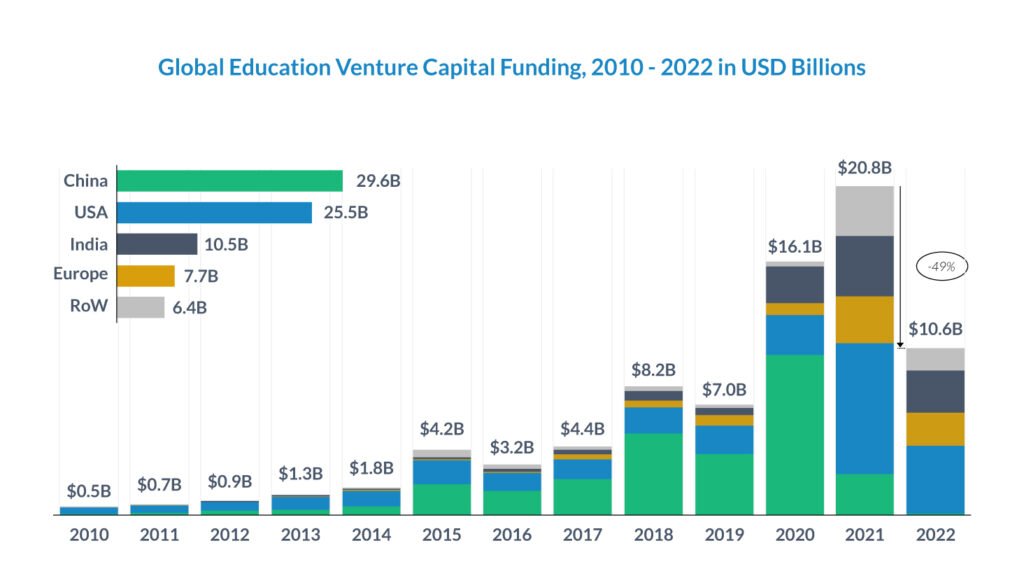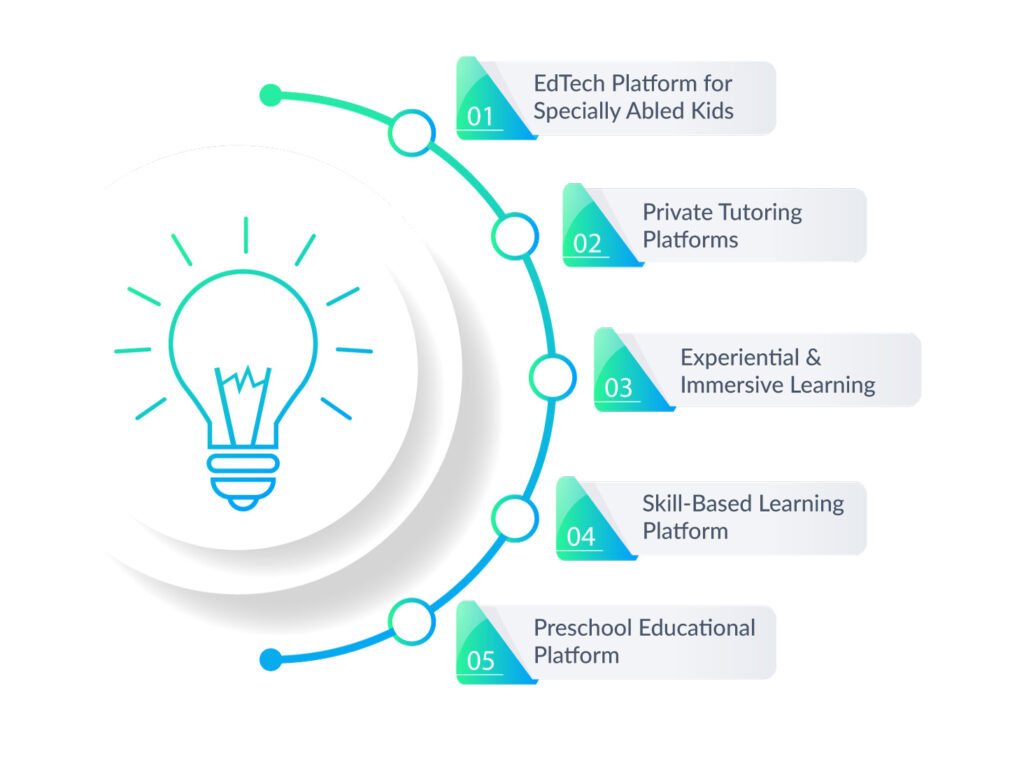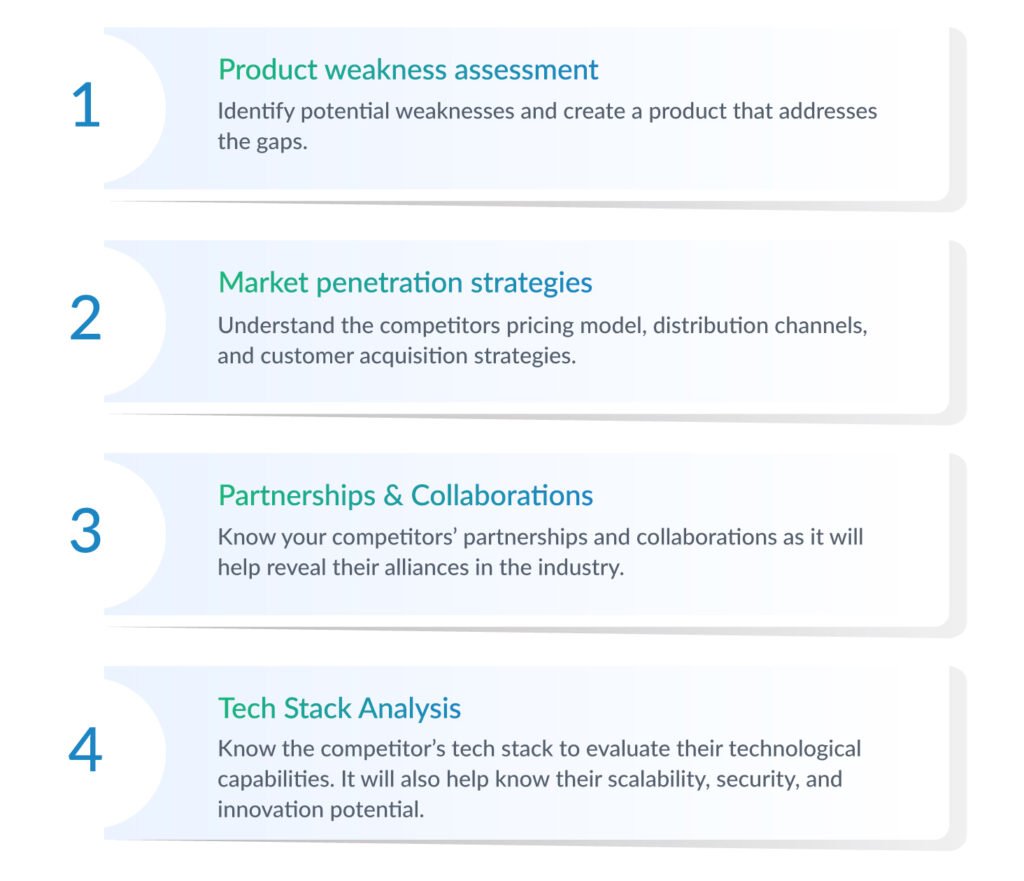The Complete Guide To EdTech Startup
Table of Contents
The evolution of Education Technology (EdTech) is bringing forth impactful tools and systems to enhance learning and teaching. Taking advantage of this evolution and the future potential, several startups launch their products and services with the hope of making it big.
Multiple startups are born every year to address the challenges facing the education and corporate training industry. We are in an era where the traditional learning method is taking a backseat giving place to online learning. Online learning platforms allow a continuous and dynamic flow of information for all learners.
The edtech industry’s CAGR is expected to increase to 19.1% to achieve a market value of $347 billion by 2031. As educators and companies are finding the best ways to engage with their students and employees, edtech companies have an opportunity to address their concerns and deliver effective solutions.
In this guide, we will talk in detail about edtech’s global scenario, successful edtech startups, reasons for failure, and a few suggestions to building a successful edtech startup. So grab your cup of coffee and let’s get going.
Global Landscape of EdTech Industry
Globally, the edtech industry is on a growth trajectory. Huge amounts of money are injected into the industry, fueling innovations and new technologies.
Between 2019 ($7.08 billion) and 2020 ($16.1 billion), the edtech sector secured more than 50% growth in investments. But this funding dropped down by more than 49% between 2021 and 2022, $20.8 billion to $10.6 billion.

Global VC funding in edtech. Source: HolonIQ
But why?
The boost edtech sector received from the pandemic quickly washed away once the pandemic was over. However, we can expect the market to stay positive. The short-term surge brought in by the pandemic laid the groundwork for long-term technology integration into this sector. The expected market value of the edtech sector is estimated to cross $347 billion by 2031. Not to forget there is also room to develop products for the corporate training sector, OECD predicts that 1 billion people will need reskilling and upskilling by 2030.
This leaves a large enough pie for many founders and startups to enter the market and build better solutions to capture the market, gain investor confidence, and generate revenue.
Reasons to Consider Launching an EdTech Startup in 2023
The edtech sector has immense growth potential, as we have seen in the previous section. This growth potential is seen for different reasons, which we will be discussing in this section.
Growth Potential
Even after a slower 2022, the future of the edtech sector remains strong. Several analytical reports and organizations have predicted that the industry will grow further. Employees will need to re-skill and upskill themselves to remain relevant in the future. Plus, students at all levels will continue to engage with technology, which creates room for edtech companies to build solutions that will fuel their requirements.
EdTech startup founders must identify these gaps and leverage advanced technologies like Artificial Intelligence, Machine Learning, Virtual Reality, and Augmented Reality to help fulfill the demand for access to information.
Education is a Lifelong Journey
Even in the yester years, learning was considered as a continuous process. Now that we have access to online learning platforms and multiple systems, learning has become a lifelong journey.
People of all ages and backgrounds are learning to become better at their skills and gain more knowledge. EdTech startups can capitalize on this learning momentum to build platforms meant to empower users with continuous learning.
Work From Home Momentum
The shift in work culture and settings has changed how businesses operate today. The work-from-home culture has increased the demand for adaptive learning solutions that cater to the learner’s needs and schedules. They require flexible learning environments and personalized learning systems to address their individual skill gaps.
The world needs a digitally mature workforce. In the wake of a tight labor market and lack of skills, attracting and retaining talent has become a challenge. Hence, companies like Google, Amazon, and Walmart have heavily invested in workforce education.
These organizations are entering into strategic partnerships with edtech platforms and providers to deploy custom learning solutions specific to the company’s requirements.
These programs are meant to reduce churn and fill talent gaps. Here is an opportunity for edtech startups to find solutions in the line of enterprise offerings. With enterprise offerings, companies can continue improving employee skills while working from home.
Online Education is the New Norm
There has been a shift in traditional education for good. GenZ is already familiar with the online education system. In the future, they will prefer learning online, which means there will be more demand for edtech platforms.
Here, edtech startups can focus on Edutainment. Combining education and entertainment will help in increasing engagement. By 2025, the Edutainment industry is expected to cross $10.11 billion.
EdTech startup founders can draw inspiration from the fact that several edtech companies drew millions of dollars in investments. In the next section, we will discover some innovative edtech start-up ideas that have the potential to achieve great success.
Innovative Ideas for your next EdTech Startup
The edtech industry is overflowing with numerous opportunities and new ideas can transform the outlook of digital education.
Here, we are sharing some POC-worthy ideas you can check out for your edtech startup.

EdTech Platform for Specially Abled Kids
Building a kinematic-based edtech platform for specially-abled kids can help them learn faster. Kids diagnosed with Autism, Dyslexia, and ADHD need an adaptive learning environment, and technologies like AI and ML can help personalize their learning experiences.
Private Tutoring Platforms
Taking inspiration from home-based personal tutors, edtech platforms can offer a similar version of this teaching method. Instead of a teacher to teach, you can create a platform where AI-enabled bots can provide personalized tutoring. This model will adapt to the student’s capabilities, get relevant content from the web, and provide tailored feedback.
Experiential & Immersive Learning
While students learn about theories in classrooms, an edtech startup can be set up to bring theories and principles to life. By offering experiential and immersive learning experiences with Augmented Reality (AR) and Virtual Reality (VR), students can get practical and life-like information in real-time.
Skill-Based Learning Platform
New technologies are creating skill gaps. EdTech entrepreneurs can take this opportunity to provide solutions for the users to gain the required skills. For corporate sector offering skill-based learning programs, technologies like AI can supercharge the process of learning.
Within this, there are numerous niches to choose from and provide the right, in-demand skills. A good thing to do here would be to get experts from the field that doesn’t have too much competition.
Preschool Educational Platform
The idea of learning for preschool kids has been under discussion for long. While the pandemic gave the perfect test ground to the students, mixed results emerged. Yes, there are issues with preschool student’s concentration, consistency, and retention in online learning.
However, this is where you can provide a platform allowing parents to join in with their children and help them stay focused. This will be a platform built specifically for preschool kids and has elements that promote learning at a younger age.
Having seen some of the innovative ideas for edtech startups, let’s now take a closer look at the success stories of those who have already accomplished great things in the field of edtech.
EdTech Startups that have made it BIG!
While there are thousands of edtech organizations doing good work, a few of them stand out for their progress and achievements.
Byjus
Byjus started its operations in 2011 and is now working in 100 countries, offering its services to more than 150 million registered students. Byju’s has raised over $5.9 billion through 29 funding rounds.
As India’s second decacorn, Byju’s success is credited to its early entry into the market, acquisitions, and strategic expansion into different education segments. Byju was also quick to leverage the halt in the flow of information during the pandemic. Byju focuses on delivering high-quality education through quality teachers shared through videos. Their engaging content has led to impressive levels of student engagement and retention.
Digicorp has worked closely and extensively with Byju to create a series of in-app features and solutions. We have delivered the following components for Byju’s platforms;
Question and Solution Portal
Web Search Portal
Question to Concept portal
Auto Grading System
Universal Knowledge Graph
Question Quality Checking Portal
Universal Content Management System
Building these solutions for the edtech giant has allowed us to experience first-hand the internal workings of an edtech organization. We are ready to use our experience and share the insights gained from working with Byju to help you build your edtech solution.
GoStudent
GoStudent is another edtech platform that has observed explosive growth. GoStudent helps students find tutors for over 14 subjects. Considered as the world’s largest online tutoring service provider, GoStudent has a simple operation, which is to fill the gap of a good teacher.
The online tutoring platform is rapidly expanding, covering international market, explicitly going to the US, Asia-Pacific, and the MENA region. GoStudent uses AI to assess students’ needs and identify an ideal tutor. It has become popular due to its individual support system, which brings the best of education to the students.
Physics Wallah
One of the unexpected examples of success in the edtech world is India’s Physics Wallah. This edtech platform, which focuses on online and offline learning, aims to generate over $300 Million in revenue in 2023-2024.
They provide affordable online and offline education to the Indian diaspora. Using the power of Generative AI, Physics Wallah translates its YouTube content into different languages, drastically increasing viewership and subscriptions. Affordability is the best thing about Physics Wallah.
Chegg
Chegg started as a physical and digital textbook rental company in 2005 providing multiple services to students. They provide textbooks for rent, help with homework, provide online tutoring, and offer scholarships to the students.
In addition to this, Chegg has also launched Uversity in 2021, which is a dedicated platform for educators and tutors. A platform for educators, Uversity allows users to share their teaching material and supplemental learning content.
Like other edtech startups in this list, Chegg has also seen exceptional growth. In addition to offering educational content, Chegg subscribers can access internships and scholarships. Chegg has acquired 17 startups from the edtech market to reach its current position.
Kahoot
Kahoot is one of the best examples of game-based learning and has proven its potential to help students learn with fun-filled games. Kahoot presents user-generated MCQs for the users. Started in Norway in 2012, Kahoot has built a formidable rapport in the North American market and today, 97% of the Fortune 500 Companies use it.
Today, Kahoot is also used by several organizations as a business tool for internal training. Kahoot’s mission is to help children, students, and employees unlock their full potential.
| EdTech Firm | Revenue (2022) | Number of Active Users | Funding Raised (Total) | Latest Valuation | Reason for Success |
| Byju’s | $390 Million | 150 Million | $5.9 Billion | $5.97 Billion | Leveraging technology to build interactive and effective learning experiences. |
| GoStudent | $338.1 Million | 500,000 | $600 Million | $3 Billion | GoStudent has become popular for its high-quality personalized tutoring service. |
| Physics Wallah | $26.7 Million | 4 Million | $100 Million | $1.1 Billion | Affordable education available to all, making learning accessible. |
| Chegg | $779.9 Million | 8.2 Million | $227.3 Million | $1.37 Billion | Chegg’s rental program and its exclusive library of educational material is unmatched. |
| Kahoot | $146 Million | 1.3 Million | $52.3 | $1.7 Billion | Gamification has become a big reason for Kahoot’s success. |
The journey from launching a startup to a Unicorn isn’t the same for everyone. Although the above-mentioned startups have achieved unprecedented success, they did face several challenges. However, some succumbed to internal and external challenges, leading to a shutdown.
Examining the Challenges Faced by Few Unsuccessful EdTech Startups
When a horse loses the race, people either blame the horse or the jockey. But it isn’t always the horse or the jockey. The moment a startup is born, the odds are against that company, as 2/3rd of the startups fail to generate a positive return. Let’s go through some of the reasons for edtech startup failure.
SharpScholar
SharpScholar began its operation in 2014 and failed after only two years due to many reasons. SharpScholar was built to offer a better way for teachers and students to connect over a dedicated platform.
One of the main reasons for failure was the complex interconnection between the student, the teacher, the school administration, and the government. A teacher’s preference for a product had to take into account the student’s needs, the budget, the school policies, and even the administration’s approval. This complicated SharpScholar’s relationship with the teacher and resulted in a lack of focus on the target audience for whom the product was being developed.
Tutorspree
Tutorspree, launched in 2010 and was forced to close in 2013. It helped tutors and students connect with each other by charging a fee from the tutors. Initially this fee was 50% of what the tutors were charging, which became a big motivator for the tutors to connect with students outside of the platform.
Hence, they didn’t take a proactive approach to getting contracts. Without any regulation, there was nothing stopping the tutors from connecting directly with the students. This was the prime reason why it had to force-stop its operations.
LearnArt
LearnArt was an Indian EdTech startup that succumbed to the higher CAC (Customer Acquisition Cost). Their CAC was 20-35% of the price of a single course. LearnArt was a bootstrapped company and higher CAC was not acceptable to the founders. The company wrapped up before things got worse.
Every business needs fuel to grow which comes in the form of funds from different sources. It can replenish quickly if not managed properly. Several reasons accrue to this lack of funds, including High Customer Acquisition Costs (CAC). A higher CAC forces the companies to push up the price, which can often lead to product failure.
Knack for Teachers
“I should have done more research about teachers before I started coding.” These are the words of the Knack for Teachers founder Jarrod Drysdale. Knack for Teachers was a gradebook solution for teachers giving them analytical and visualization tools to show student’s progress. Knack for Teachers shut down in 2011 after running for a little over 1 year.
Not that Jarrod didn’t talk to the teachers. But, his research was limited to friends and family. A lack of proper market-wide research led to the failure of Knack for Teachers.
| EdTech Firm | Reason for Failure | Total Funding | Years Operated |
| SharpScholar | Built an interdependent product, whose adoption was dependent on multiple roles (students, teachers, and administration). | N/A | 2014 to 2016 ( 2 Years) |
| TutorSpree | Failed to establish a system to retain students after signup. | $1.8 Million | 2010 to 2013 (3 Years) |
| Learn Art | High CAC, leading to cash burnout. | $30,000 | 2020 to 2021 (1 Year) |
| Knack for Teachers | Lack of market research leading to the development of an unwanted product. | $1.5 Million | 2010 to 2011 (1 Year) |
From the beginning of the company to running the operations, getting customers, maintaining costs, and everything else requires careful planning. There will be challenges across the way, which is why we have come up with a strategic approach.
Guiding Steps to Initiate and Succeed in Launching an EdTech Startup
From the outside, everyone wants a pie of the profit share in the edtech sector. However, from the point an entrepreneur envisions building an edtech startup to the point it starts generating revenue, a lot of planning, decision-making, and research is required. Here’s a small guide you can follow to start and succeed with your startup.
Know the Sector
Thorough planning, vision, and research are crucial to build the foundation of a successful startup. Along with effective market research, you need to answer the following questions:
- What type of product is needed?
- What are the customer pain points?
- What types of products in the market are successful?
- Knowing everything about the failed startups, with an insight on why they failed.
Get access to right data to identify your niche to ensure unique positioning of your idea. The product you are offering must have something different or better than what is already available in the market.
Define and Understand the Target Market
Understanding your customers and target market is the key to building effective solutions. Instead of launching a product for everyone, specialize by targeting a specific audience.
Whether you want to target, K-2, K-6, K-12, college students, or corporate employees, understand their needs and preferences. The information you gain here will become the foundation to build a unique product.
Create customer personas, which include:
- Age
- Gender
- Location
- Education
- Income
- Occupation
Pro Tip: In addition to knowing your target audience demographics, dive deep into the “Why” the customers would buy your product or service. This is an important metric for your future marketing and growth efforts.
Do the Competitor Research
Knowing your competitors is pivotal to ensuring a startup’s success. Founders and their team needs to dive deep into the competitors and understand their strengths, weaknesses, opportunities, and threats (SWOT).
In addition to this, doing the following will further help gain a better understanding:

Use this information to create a product or service that sets you apart from the competition.
Validate Your Idea
By now, you will know your niche, target audience, and competitors. Based on this understanding, you can validate your idea and ascertain that there is indeed a market need for the product.
Conduct user interviews through polls, surveys, etc. and ask questions about the end-users lives related to the scope of your product. Ask them about challenges or situations they face. Avoid using the word problems. Ask about past experiences. Ultimately, you want to gather facts and not opinions or hypotheticals.
Invest In Good Platform Designing and Branding
Startup founders need to focus on branding and designing once they have defined the product. Good designing is crucial to turn visitors into paying customers.
Using your understanding of the target audience, competitors, and market, build bespoke product design to address operational and design gaps.
For the design part, here are a few recommendations:
- Keep the design simple, convenient, and easy to navigate.
- Avoid cluttered applications or product design.
- Learn about color psychology, as it can help you choose a color palette that aligns with your customer’s feelings and emotional needs.
For an edtech startup, trust is an essential commodity to succeed. Through branding, you need to build trust, and their trust in your company will bring money.
Hire an Experienced Development Partner that helps in Growth
In a competitive edtech market, to create a thriving product, you need a strong development partner like Digicorp. They can offer insights and experience gained from previous projects and collaborations.
In your team, you must have a project manager, business analyst, software or app developers, UI/UX designer, product manager, and quality assurance testers.
While choosing your development partner, check their portfolio and conduct developer interviews.
Build an MVP and Listen to Feedback
Build a Minimum Viable Product (MVP) and validate it before full-scale development. A MVP will allow you to test all the assumptions, design patterns, and features before you can finalize all the elements.
Building an MVP will cost less and take less time. As a result, you can quickly know the audience’s response. If you have proof of concept, that means you can move ahead with the full-scale development.
POC and MVP success are crucial to show the investors that you have built a valuable product. An MVP will allow you to gauge the customer and market response towards your product. Based on the response, you can make changes before launching a full-scale production process.
With this approach, you can build a tested and audience-centric product for your EdTech startup. However, it doesn’t end here. In our upcoming blog, we will learn in detail about different monetization strategies as well as about funding options for your edtech platform.
Digicorp’s Way of Supporting EdTech Startups For Success
Digicorp has proven expertise in helping edtech startups build future-ready products and solutions. Having worked with edtech companies like Byju’s and JetPacked, we have gained immense experience in creating platforms that help businesses grow and expand.
While you bring the idea, we bring the execution and implementation expertise to turn your ideas into reality.
Get in touch with us to know more about how Digicorp can help you grow in your journey towards success.
Nachiket Patel
Co-Founder, VP (DIGICORP)
Nachiket Patel
- Posted on November 28, 2023
Table of Contents









